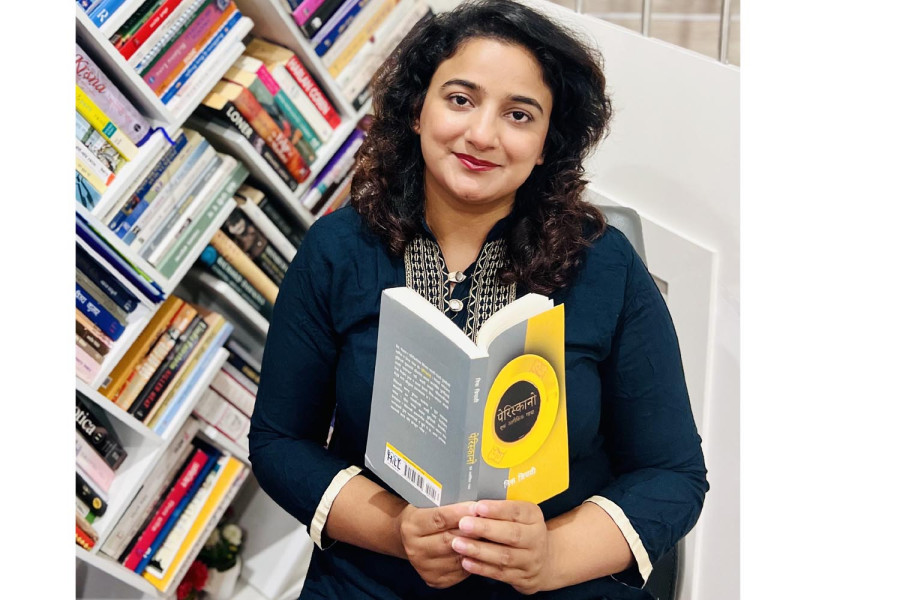Books
I am committed to writing about women’s empowerment
Writer and journalist Niru Tripathi discusses her favourite reads and striking a balance between journalism and fiction.
Anish Ghimire
Niru Tripathi is the editor-in-chief of a digital magazine, ‘Cald Voices’, a public relations officer and executive assistant to the consulate general of Nepal to Victoria. She did her master’s in professional and organisational communication (journalism) from Victoria University in Melbourne, Australia and published a novel titled ‘Parisscano’ in 2020. She is currently based in Melbourne, Australia.
In this interview with the Post’s Anish Ghimire, she discusses her favourite reads and merging journalism with fiction writing.
Could you tell us about your background in literature and how you first got into journalism and writing?
For me, writing is more than just a passion; it’s a natural calling. Words, to me, are like companions in a dance of expression. Back when I was waiting for my SLC results, while others went to Kathmandu for bridge courses, I found solace in the novels of BP Koirala. His words inspired me, sparking a dream to one day write a fiction book with characters born from my imagination.
I still remember my first book, ‘Patachara’, which I read at the age of ten. Stories from my mother during meals and before bedtime further fueled my love for crafting narratives and developing characters. As I delved into newspapers like Wisdom, Muna, and Madhuparka, I dreamed of seeing my work in print.
My school principal, Purusottam Lohani, suggested pursuing journalism or law after SLC. After earning a bachelor’s in journalism in Nepal, I went on to pursue a master’s in media/journalism in Melbourne. My dreams of running a digital news outlet and publishing novels have now become a reality.
As someone involved in both journalism and creative writing, how do you balance the objective reporting required in journalism with the creative expression found in writing fiction or other forms?
Being involved in both journalism and creative writing requires a delicate balance between the objective reporting demanded in journalism and the imaginative expression found in fiction.
In journalism, I stick to hard facts and follow ethical codes, ensuring objective reporting. When it comes to fiction, I embrace the freedom to express myself creatively, akin to a free bird soaring in the sky.
To what degree are you influenced by other authors?
My writing is deeply influenced by BP Koirala and it incorporates elements of love, romance, tragedy, irony and a strong commitment to women’s empowerment. My debut novel, ‘Parisscano’, reflects my passion for breaking societal norms and challenging stereotypes surrounding female empowerment. Exposure to Western writing styles, particularly Virginia Woolf’s British modernist “stream-of-consciousness” style, has left a lasting impact on my work.
Drawing inspiration from literary giants like Simone de Beauvoir, especially her seminal work ‘The Second Sex’, made me understand women’s condition in a patriarchal world. This awareness seeps into my writing and I often comment on the societal position of women.
My academic journey has further enriched my creative reservoir, involving the study of important English works, criticism theories, ‘Oedipus Rex’, Shakespeare’s poetry, Robert Frost’s verses and Sigmund Freud’s psychoanalytic thoughts.
Is it crucial that literature, in any form, questions preconceptions?
The role of literature in shaping public perceptions is big. It serves as a mirror reflecting society’s intricacies, fostering empathy and understanding. Literature has the power to challenge, question and provoke thoughts, ultimately influencing how people perceive the world around them. In an effort to be as free and transparent as possible, literature should aim to lead society on issues that pique our curiosity about our existence. I also think that it has the ability to shape public opinion and question assumptions that they hold.
What advice would you give to journalists and writers in finding their unique voice?
For budding writers and journalists, my advice is straightforward: persist in pursuing your dreams, embrace your individuality and avoid mimicking others. While inspiration is valuable, the key is to discover and establish your own voice and style. Be authentic and present that to the world. The world appreciates your originality, not a duplicate. So, carve your own path, aim for excellence, and don't be disheartened by setbacks.
How can literature and reading be promoted to a wider audience, especially in the fast-paced digital age?
In the fast-paced digital age, promoting literature to a wider audience necessitates embracing technology and adapting to changing preferences. Leveraging social media, streaming platforms and interactive online forums can make literature more accessible and appealing. Creating visually engaging content such as book trailers, author interviews and immersive online experiences can capture the attention of digital-savvy audiences.
Collaborating with influencers and utilising book-related hashtags can amplify the reach of literary content. Additionally, fostering virtual book clubs, discussion forums, and interactive events can build a sense of community among readers.
Integrating literature into multimedia formats, such as podcasts and interactive e-books, can cater to diverse learning styles. By combining the timeless appeal of literature with the dynamic tools of the digital age, we can ensure that reading remains a vibrant and integral part of our ever-evolving cultural landscape.
Niru Tripathi’s book recommendations
Patachara
Author: Basudev Dhesar, Kondanya
Year: 2009
Publisher: Dots Printing House
This book explores the universal reality of trauma and the choice we have in how we relate to suffering. It taught me that amid life’s challenges, atonement and responsiveness can lead to awakening. This was the first non-course book I read in my childhood.
Sumnima
Author: BP Koirala
Year: 1969
Publisher: Sajha Prakashan
‘Sumnima’ prompts readers to reflect on their values, beliefs, emotions and thoughts. It is a compelling read that captures the clash between materialism and spiritualism, emphasising how the former can overshadow spiritual quests, confining emotions and desires.
Bhagavad Gita
Author: Ved Vyas
‘Bhagavad Gita’ is a timeless masterpiece that transcends religious boundaries, offering great insights into the complexities of life, duty and spirituality. Its themes of selfless action, ethical conduct and the pursuit of knowledge offer invaluable guidance for us all. It promotes inner resilience, ethical decision-making, and a deeper understanding of the self.
Pagal Basti
Author: Saru Bhakta
Year: 1991
Publisher: Sajha Prakashan
‘Pagal Basti’ by Saru Bhakta is an engaging tale about Prashant and Martha, who are both dealing with immense dissatisfaction and guilt over their lives. It is a thought-provoking read and strikes a good balance between storytelling and philosophy.
Oedipus Rex
Author: Sophocles
Year: 430-426 BCE
This play explores the intricate web of fate, destiny and the consequences of one’s actions. ‘Oedipus Rex’ challenges conventional notions and showcases how life’s twists can lead to unexpected and sometimes, tragic outcomes. It’s a timeless piece that continues to resonate with the questions it raises about the human experience.




 9.7°C Kathmandu
9.7°C Kathmandu










